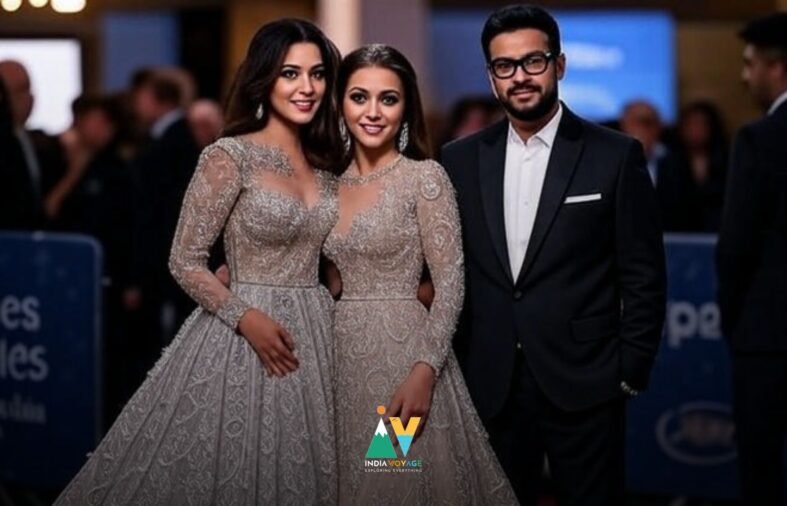The Cannes Film Festival is a cinematic shrine. It’s where legends like Satyajit Ray earned global reverence and where contemporary Indian filmmakers like Payal Kapadia chase Palme d’Or glory. The Croisette’s red carpet has long been a stage for artistry, ambition, and storytelling. But in recent years, a new wave of Indian stars has stormed the festival—not directors or actors, but influencers. From Nancy Tyagi’s self-crafted gown to Ankush Bahuguna’s boundary-breaking beauty looks, Indian influencers, curated by Brut India, are stealing the spotlight. It’s a dazzling narrative of small-town dreamers conquering a global stage. But beneath the glamour lies a troubling question: Is this a celebration of India’s diverse voices, or a commercial hijack of Cannes’ cinematic soul? Let’s dive in.
The Red Carpet Puppet Masters
Brut India, a digital media outfit known for its punchy, socially aware videos, holds a coveted role as Cannes’ official media partner. This gives them access to the festival’s elite inner circle: red carpet walks, exclusive screenings, and high-profile galas. They’ve leveraged this privilege to launch the “Brut Indian Squad,” a handpicked group of influencers who represent India’s modern spirit. In 2024, the squad featured Nancy Tyagi, a Sonipat native who turned heads in a gown she stitched herself, and Aastha Shah, a vitiligo advocate redefining beauty standards. On the surface, it’s a heartwarming story of inclusivity and ambition.
But here’s the rub: Cannes is a film festival, not a fashion runway or a TikTok convention. So why are lifestyle bloggers and beauty influencers hogging the limelight? And who decides which creators get this golden ticket? The answer lies in a murky blend of social media clout, brand sponsorships, and a questionable commitment to “cultural representation.”
The Price of Prestige
Let’s talk numbers. A single Cannes red carpet appearance can cost upwards of ₹30 lakh, factoring in tickets, travel, visas, and designer outfits. Do influencers pay this? Hardly. Heavyweight brands like L’Oréal, BMW, and Visa foot the bill. In return, Brut’s influencers churn out polished Instagram Reels and YouTube vlogs that double as slick advertisements. Nancy’s viral pink gown wasn’t just a fashion moment—it was a billboard for Indian craftsmanship. Ankush’s sharp suits? A showcase for young designers, laced with plugs for his beauty brand partners.
This isn’t philanthropy; it’s a business deal. Influencers with massive followings are walking marketing campaigns, and Cannes’ prestigious backdrop amplifies their reach. Brut handles the logistics—visas, media access, event invites—while brands bankroll the spectacle. The influencers gain fame, followers, and a fairy-tale moment. Brut gains viral content and industry cred. It’s a win-win. But for whom? Certainly not the filmmakers toiling for years to earn a Cannes slot.
A Selection Process Shrouded in Mystery
Cannes is famously rigorous about its films. Directors endure grueling scrutiny to land a spot in competition or Un Certain Regard. But for influencers, the entry bar seems suspiciously low. Brut’s selection process is opaque, with no public applications, no transparent criteria, and no clear connection to cinema. They favor creators with big audiences and compelling personal stories—like Viraj Ghelani’s comedy or Aastha Shah’s advocacy—but the process feels arbitrary. Why them? Why not others?
This lack of clarity has sparked outrage. On X, film buffs and industry voices lament that influencers are eroding Cannes’ legacy. One user quipped, “Cannes is for cinema, not clout-chasing. This isn’t a music festival.” Another highlighted the disparity: indie Indian filmmakers, who pour their hearts into their craft, rarely get the red carpet access that influencers waltz into. The criticism stings because it’s rooted in a painful truth: Brut’s influencer showcase often feels like a commercial stunt, prioritizing viral moments over cinematic substance.
The Counterargument: Influencers as Modern Storytellers
Brut India isn’t deaf to the backlash. Their defense? Influencers are storytellers in their own right. In an era where digital platforms shape global culture, creators like Nancy Tyagi, who rose from a small town to global fame, or Ankush Bahuguna, who challenges gender norms in beauty, embody India’s dynamic spirit. Cannes, they argue, isn’t just about films anymore—it’s a cultural crossroads where fashion, media, and innovation intersect. By spotlighting influencers, Brut claims they’re breaking down barriers, giving everyday Indians a chance to shine on a world stage.
There’s merit to this. Nancy’s hand-stitched gown was more than a dress; it was a defiant statement that talent transcends privilege. Aastha’s presence pushed back against rigid beauty ideals. These stories captivate millions, especially younger audiences who may never watch a Cannes-winning film but will binge-watch red carpet Reels. Supporters say this isn’t a betrayal of Cannes—it’s an evolution, reflecting how storytelling has expanded beyond the silver screen.
Yet the optics are hard to shake. When influencers overshadow filmmakers, it feels like a slap to Cannes’ core mission. When Brut’s selection process remains a black box, it invites distrust. Are they choosing creators who truly represent India, or those who align with lucrative brand deals? Is this about celebrating culture, or cementing Brut’s own influence? The absence of answers fuels the perception that Brut is exploiting Cannes’ prestige for profit.
There’s a better way. Brut could adopt a transparent selection process, with clear criteria that prioritize creators tied to cinema—think film critics, short filmmakers, or even actors. They could balance their squad with more industry voices, ensuring the red carpet honors the festival’s roots. And they could dial back the brand-driven hype, letting authentic stories take center stage without feeling like sponsored content.
A Call to Action
The Indian influencer invasion at Cannes isn’t inherently bad—it’s a sign of changing times. But it needs guardrails. Brut India has a unique opportunity to bridge cinema and digital storytelling, but only if they prioritize integrity over commerce. As viewers, we can demand better too. Engage with Cannes’ films, amplify indie filmmakers on social media, and call out gatekeepers who sideline art for profit. The Croisette deserves to be a stage for stories that endure, not just stories that trend.
What do you think? Should influencers have a place at Cannes, or is this a step too far? Share your thoughts below, and let’s keep the conversation going.











Leave A Reply